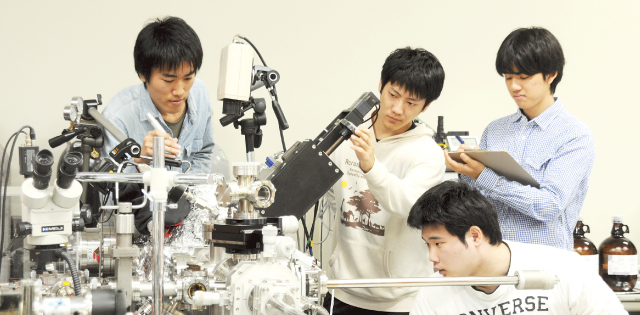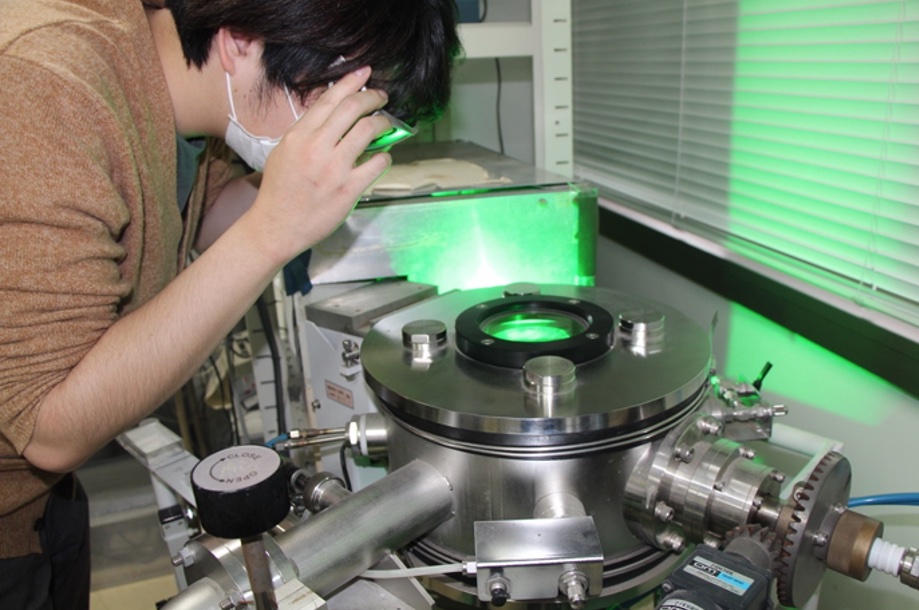
Electrical and Electronics Engineering
Scientific technology in a highly-advanced information-oriented society is characterized by the evolution and systemization of cutting-edge individual technologies such as new materials, VLSI, computers, etc. In particular, electronic device engineering for the development of new materials and devices based on new concepts, electrical power engineering for new electrical energy sources and the systematic utilization of electrical energy, and communication systems engineering for the systemization of communication, information, and computer technology, are all basic technologies that are utilized everywhere in the modern world and form the foundation of an information-based society.
In response to the modern organization of electrical and electronics engineering, our depa Molecular Biologyto three courses for education and research purposes: Electronic Device Engineering, Electrical Power Engineering, and Communication Systems Engineering. Our goal is to develop human resources who are qualified to take central and leading roles in the state-of-the-art electrics and electronics fields along with related interdisciplinary areas. Our post-graduate education fosters highly-specialized experts and researchers with a deep understanding of their respective fields, who can see the entire body of scientific technology from a broad point of view, and possess the ability to think outside the box.
Educational Goals (Philosophy) and Prospective Students
Our educational goal is to foster basic skill, and ability to apply that skill in electrical and electronics engineering, in technical experts and researchers who possess a high sense of engineering ethics, an abundance of creativity, and can contribute to an advanced information oriented society. We welcome those with basic academic ability, who understand our educational goals, and are eager to obtain highly specialized capabilities through education and research.

Admission Policy
We aim to develop creative and specialized professionals who can pursue world-leading technology, possess specialized knowledge, have the ability to make sound ethical judgments, and will take leadership roles in an industry that leads an advanced information-oriented society.
Prospective Students
- Those with broad outlooks who can freely utilize their high-level of expertise to respond swiftly and flexibly to the appeal of a diverse and dynamically changing society.
- Those who have the creative capacity to invent new technologies and solve problems related to electrical and electronic engineering.
- Those who are highly-motivated to lead an advanced information-oriented society and those who are committed to contributing to local and global communities.
Course Work
◎Electronic Device Engineering
An advanced information-oriented society is grounded in a large variety of electronic devices. While conducting research into the operating principles of electronic devices, this course also researches the design of essential materials needed for high-performance electronic devices, manufacturing processes, etc. Research and education focuses mainly on the manufacturing process of devices using high-temperature superconducting oxide thin films, transparent conductive films for displays, photo-rechargeable batteries, physical properties evaluation using photo-electron spectroscopy, the plasma process, laser evaporation, and vapor-phase growth.

◎Electronic Power Engineering
We offer research and education regarding the theory of system structures in systematic control theory, the design of a robust optimal control system, noise dampening in DC-DC converters as an electric energy conversion system, as well as research on making the systems perform higher, with higher reliability, more intelligent, and smaller in size from both an analytical and experimental aspects. In addition, research is being conducted to improve performance using the applications of superconductor technology in response to the demand for a high-quality, highly-reliable electrical systems. Education and research regarding degradation diagnosis technology of power supply systems in order to upgrade reliability is also being developed.

◎Communication Systems Engineering
Research and education is conducted on electric circuits, computers, communication instruments, LSI, audio information processing, GPS systems, and power systems to support a networked and information-oriented society. Particular emphasis is placed on optical fiber communication technology, ultra-high frequency circuit technology, system LSI technology, the development of a multi-agent system through soft information processing, construction of a next generation multi-media platform, analysis of electric power system design, and power system development.
Curriculum
“Advanced Electrical and Electronic Engineering”is the core of the course work. It is a high-level lecture class on the fundamentals of the three fields. Students study electronic device basics, digital control theory, and optical communication systems theory through which they gain an understanding of the interrelationship of each field with others in the course.
“Advanced Electrical and Electronic Engineering,”special research, and seminars are required subjects. A total of 12 credits or more should be acquired from both required and elective classes, classified into three groups (A, B, and C) corresponding to each course. 6 or more credits should be obtained from each group.
List of faculty members
The following specialists provide research and education support to students and help find solutions to student academic issues.
